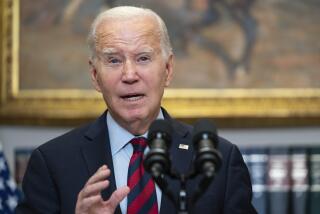New Book Is Abridged Edition of Clinton
WASHINGTON — President Clinton’s new volume of reflections on his hoped-for next term may be more notable for subjects it leaves out--such as campaign finance and entitlement reform--than the compendium of familiar proposals and themes that it recites.
Scheduled for pre-convention release this weekend, “Between Hope and History” offers a tour d’horizon of dozens of proposed and completed Clinton initiatives, ranging from top items such as deficit-cutting to the small-bore plan to distribute cellular telephones to Neighborhood Watch groups.
But unlike his 1992 campaign manifesto, “Putting People First,” the president says nothing in the book about the campaign reform measures he then declared were needed to free a country “held hostage by big money interests.” Nor is there any mention of a subject Clinton himself has identified as one of the biggest challenges of the years ahead--reform of the huge federal entitlement programs, including Medicare and Social Security, which consume half the federal budget.
Brief mention is accorded the beleaguered federal anti-drug effort, a topic that got nearly a full chapter in 1992. Gay rights, a difficult area for the White House since the beginning of his term, goes wholly unmentioned in a section on civil rights.
Clinton has said that the book, published by Times Books and priced at $16.95, is intended to present his thoughts on the future and “what I want to do” in a second term. While aides have said that it does not contain a complete list, the topics clearly closest to the top of the administration agenda are developed in detail in the 178-page volume.
Indeed, the book recalls the president’s approach in his first presidential campaign, when admirers joked that he had a five-point plan for every problem.
Also striking, though not unexpected, is a strong emphasis on what Americans can do to help themselves, rather than on what government can do for them.
The book’s three sections are built around what Clinton sees as the three fundamental American values--opportunity, responsibility and community. The nation’s best strategy is “ensuring that all citizens have the opportunity to make the most of their lives; expecting every citizen to shoulder the responsibility to seize that opportunity; and working together as a community to live up to all we can be as a nation,” Clinton writes.
In his 1992 book, Clinton sketched a lengthy list of new benefits that he thought the federal government should provide. In this book he portrays the Constitution as a part of a two-way deal with heavy obligations for citizens.
The book’s new Democrat emphasis on personal responsibility and a curtailed role for government puts distance between the president and some of his congressional allies. But Clinton makes clear that his move to the right stops short of the Republicans’ 1995 budget proposal and its plans to curtail future growth in Medicare.
Clinton takes on some controversial subjects. He praises the new welfare reform bill but says that it is “far from perfect” and needs changes because of cuts in nutrition aid and benefits for legal immigrants.
He offers his nuanced defense of affirmative action, saying that his goal is to “end abuses, prohibit quotas, subject affirmative action to strict review, oppose any benefits to those who aren’t qualified. But make that extra effort to see that everyone has not a guarantee but a chance.”
More to Read
Sign up for our Book Club newsletter
Get the latest news, events and more from the Los Angeles Times Book Club, and help us get L.A. reading and talking.
You may occasionally receive promotional content from the Los Angeles Times.







